#Teapot Mountain
Explore tagged Tumblr posts
Text


Teapot Mountain, New Taipei City, Ruifang District, Taiwan
Timo Volz
0 notes
Text
just ascended Baizhu to the 4th tier and I'm ...... ;-;
"My energy is on the rise... I suppose it is due to the recent improvements in my condition. I don't feel so weary, even after a full day of seeing patients. This is all thanks to your efforts."

#anything for you buddy#i bought out all the violetgrass in Wangshu Inn and the pharmacy and made Qiqi climb so many mountains looking for it for you.#I grew it too in the teapot for weeks#we used starglitter to transform one of the gems he needed#and fought the dendro cube & the inquisitor so many fucking times#to get the right drops#god it's all worth it for that voice line#why am I gonna cry#the chokehold this man has on me#I'm FINE and NORMAL about him#Baizhu#Genshin Impact#and I will do it two more times over to get him to 90#I can't wait
25 notes
·
View notes
Text

starry night ✨
#scarahida#genshin impact#nahida#the wanderer#wanderer#scaramouche#art#mine#having so much fun exploring chenyu vale and decorating my teapot i'm forgetting resin even exists#that's the stuff#anyways this one was a lot of fun#screenshot in the Bg is from that one mountain right under celestia#heehee#🥰
53 notes
·
View notes
Text
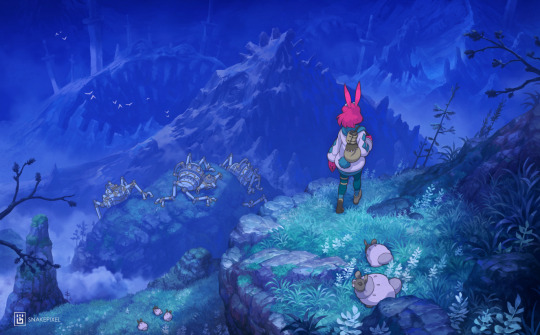
"The teapots are crossing Godmouth"
The next explorer painting is finally done! I started this last year and appreciate everyone stopping by to watch the process. This also marks the start of my print shop! If you want this as a print, you can find it here: https://www.inprnt.com/gallery/snakepixel/godmouth/
#snakepixel#explorer#mira#print#godmouth#mountains#landscape#digital painting#digital art#digital illustration#teapot
146 notes
·
View notes
Text






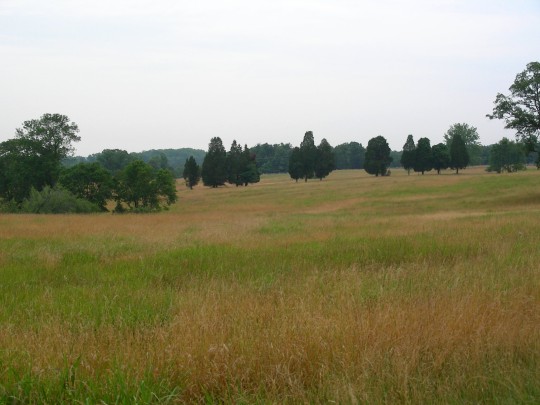

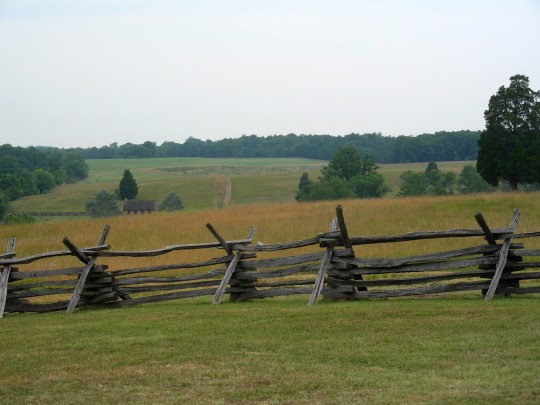







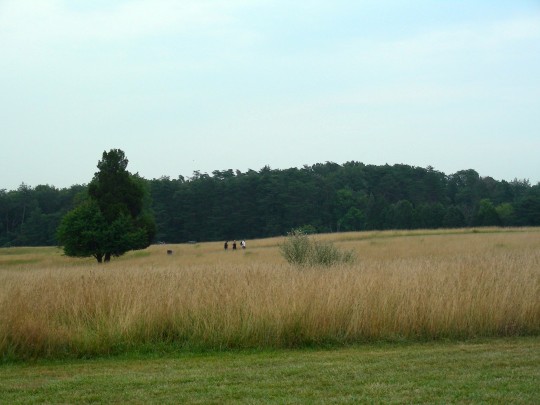









The state of Virginia's secession convention voted to secede from the United States, later becoming the eighth state to join the Confederate States of America, on April 17, 1861.
#Virginia#Virginia Secession Convention of 1861#17 April 1861#anniversary#US history#Confederate States of America#USA#Chester#West Virginia#still a part of Virginia back then#World's Largest Teapot#2019#architecture#Appalachian Mountain#C.A. Smith Mansion#Arlington National Cemetery#Manassas National Battlefield#summer 2009#Potomac River#Washington DC#James River#Williamsburg#US Civil War#American Civil War#original photography#travel#vacation#tourist attraction#landmark#cityscape
3 notes
·
View notes
Text

...Is he showing his age?
#back in my day i was an immovable mountain.#PLEASE he's so embarrassed he's retreating into his teapot#( to suffocate sylvie with a pillow )#ic#dash comm.#v: consultant
6 notes
·
View notes
Photo


at this point i have a yarn wall not shelf :/
(most of the yarn is for wips and projects in the queue i swear)
also i now have most of my books in one spot now :p
also also i have my speakers hooked up to my old shitty desktop and my record player so now i can listen to music from my records, cds, mp3 player, and youtube/pandora!
#other#t talks#also pls ignore how many pepsi cans i have 💀 i swear i dont drink that much...#anyways#spent all day moving yarn n books just so i could have my speakers connected to the computer 😎 so worth it.#also all my teapots n uranium glass too...#and also had to move my desk which is about 70lbs once all the drawers are out 💀#all this cause i wanted to listen to tunes.....#and also cause i needed to move my yarns shelf cause i had a mountain of yarn sitting in front of it cause it dont fit anymore ��#now that yarn is sitting next to it pinned against the wall ¯\_(ツ)_/¯
6 notes
·
View notes
Text
Smoked morning tea straight from the bonfire on the northern mountains, with birds singing for ya & Adhaan in the background. So meditative and spiritual way to get the day started! 🇮🇶⛰️🪵
#hike#mountains#tea time#food#bonfire#walking in nature#camping#tourisim#foodblogger#amazing#awesome#nature#summer#autmncolors#teapot#breakfast#hungry#video vlog#fireplace#spiritual energy#meditatedaily
1 note
·
View note
Photo

Tea party (COMMISSION)
Finished a commission for @@Musahhs ! Thank you again :3
Posted using PostyBirb
#Fosbat#opossum#hybrid#Charmander#Mudkip#Char#Kipp#tea#party#time#forest#mountain#pond#substitute doll#substitute#doll#plushie#concern#cute#kawaii#Phanpy#teapot
0 notes
Text
My favorite characterization of Legolas is when he’s incredibly skilled and adept and fast, but also he’s a complete idiot. Just dumb as hell.
He can sneak up on anyone, ride any animal you place in front of him, and make a triple Robinhood shot into the side of a mountain 90 meters away with his bow behind his back. But he also laughed himself silly when Merry suggested they make tea in a bowl they found because “you can’t make tea without a teapot Merry it won’t work!” and if you cover his eyes he falls asleep like a parrot
#legolas#legolas greenleaf#lotr#lord of the rings#the fellowship of the ring#the two towers#the return of the king#return of the king#fellowship of the ring#fotr#rotk#tis i
4K notes
·
View notes
Text
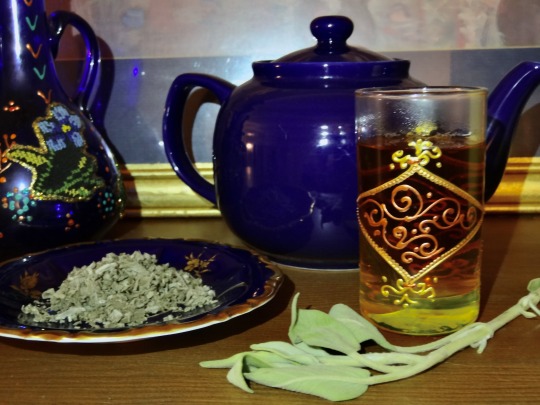
[ID: A Moroccan teaglass with a bundle of sage, a saucer of dried sage, a deep blue-purple teapot, and a Palestinian vase in the background. End ID]
شاي المريمية / Shay al-maryamiyya (Palestinian sage tea)
Palestinian sage is a common after-dinner beverage and digestive aid made from black tea and three-lobed wild sage (Salvia fruticosa syn. Salvia triloba L.). In the Levant, this variety of sage is known as "مَرْيَمِيَّة" ("maryamīyya") or, more dialectically, "مَرْمَرِيَّة" ("marmariyya").
Terminology and etymology
The term "maryamīyya" likely derives from the Aramaic "מרייא" ("marvā"), meaning "common sage" (Salvia officinalis). The modern form of the word in Arabic—as well as in Persian, in which "مریم گلی" ("maryam goli") is “sage” or "garden sage"—was also influenced by a folkloric association between sage and the مَرْيَم (Maryam) of the Bible (Mary, mother of Jesus). Dr. Tawfiq Kanaan, for example, says that Mary sat on a stone to rest after a walk in the hot summer sun, and used a few leaves from a sage plant to dry her forehead: this is how the plant got its pleasant scent, and why it is still named after Mary. The dialectical pronunciation "marmariyya" then arises through an assimilation of the second syllable to the first.
"Maryamīyya" is perhaps also related to the obsolete Arabic مَرْو ("marw"), meaning "fragrant herbs" [1]. This Arabic term is derived from the Aramaic מַרְוָא / ܡܲܪܘܵܐ ("marwā"), which refers to wild marjoram or za'tar (Origanum syriacum; syn. Origanum maru) and is related to words for fragrant herbage, marjoram, and grass (Ciancaglini; see also Aramäische Pflanzennamen, p. 193). The Aramaic is itself a borrowing from the southwest Middle Persian "𐭬𐭫𐭥𐭠" (transliterated: mlw'; pronounced /marw/) [2], which survives in several New Persian words: see for example "مرغ" ("margh"), "a species of grass of which animals are exceedingly fond"; and "مرو" ("marv"), "a fragrant herb." (Interestingly, the related Sanskrit मरुव "maruva" ultimately gives the English "marjoram" by way of Latin and Old French.)
[1] The term may also refer to the genus Maerua (to which it gives its name), and in particular the species Maerua crassifolia.
[2] See also Müller-Kessler, p. 10, and note 41 on p. 29; MacKenzie, p. 55.
Sage and Palestinian Culture
Three-lobed sage is one of the "most deeply rooted plants in the Palestinian traditional culture and ethnobotany," being the second-most-mentioned of all foraged plants (after za'tar) in a survey conducted in 2008. The connection of three-lobed sage to Maryam leads to its use in creating protective blessings at various rituals from birth until death; in the Galilee, it is burned to guard against the evil eye and to expel demons at births, weddings, and at the graves of holy people. When consumed, it is believed to help with many ailments including stomach complaints, eye diseases, and insomnia, and is used to treat livestock as well as humans.
Maryamiyya is not commonly grown as a garden herb in Palestine; rather, it is foraged from its wild range across the mountains of the West Bank, where it scents the air. Like za'atar and labna, using maryamiyya for culinary purposes is connected to Palestinian identity throughout all regions, with some people asserting that every Palestinian household must have some in stock.
Tea made with the addition of sage is perhaps the most popular herbal tea in Palestine, especially in the winter: though mint, chamomile, and aniseed are also commonly infused in water and drunk. Other varieties of sage grow in Palestine and are produced and exported by Palestinian farmers [1], but Gustaf Dalman noted in the early 20th century that three-lobed sage was the most important variety:
Of the spicy-smelling labiate flowers, which assume a significant role in the flora of Palestine, numerous sage varieties bloom in the spring. Among these the Salvia triloba, with violet flower heads on a tall shrub, is not the most colorful but is the best known, called in the north 'ēzaqān [عِيزَقَانْ] and in the south miryamīye, mēramīye thus connecting it with the Virgin Mary. (trans. Nadia Abdulhadi Sukhtian)
During the spring, sage leaves are collected and air-dried for use in tea throughout the whole year. Tea may also be made from fresh leaves, but some people consider dried to be superior. Dried maryamiyya leaves are purchased by Palestinian refugees and expatriates wherever they are. Food is thus tied to locality, memory, resistance, and terroir—a groundedness in land that considers aspects as diverse and interconnected as soil, climate, and politics. A concept of terroir in agriculture and cooking brings out how products "register[] origin and provenance."
[1] Today, the vast majority of Palestinian herb exports are to the United States, but Palestinian farmers are not able to export goods themselves—they rely on Israeli distributors and exporters, which cuts into their profits and curtails their autonomy.
Criminalizing Foraging
Ali-Shtayeh et al. noted in 2008 that the gathering of wild edible plants had been in decline in the Palestinian territories throughout preceding decades, with many young people lacking the cultural knowledge to identify and prepare wild plants. They mention several possible reasons for the decline, including an increase in intensive agriculture, improvement in national networks of roads, and the fact that some middle-aged people associate foraging with times of poverty. But we should also consider the fines, arrests, and potential imprisonment that Palestinians risk when foraging wild plants for food as a likely cause for the decline in the practice.
There are two strains of law relevant to the criminalization of foraging in "Israel" and the occupied Palestinian territories (the West Bank and Gaza: henceforth "OPT"). The first consists of primary laws which establish the right of representatives of the Israeli government to declare a plant to be a protected "natural value" (ערכי טבע), and lay out the maximum penalties people can be charged with for causing "harm" ("פג'עה") to a protected plant; the second comprises secondary declarations in the form of lists of which plants are considered protected.
The 1963 Natural Parks and Nature Reserve Law (חוק גנים לאומיים ושמורות טבע, תשכ"ג - 1963) belongs to the first strain. It empowered the Minister of Agriculture to declare a plant to be protected within "Israel," subject to the approval of a government council (ch. 5, 40-42); and declared that harming a plant was an offence punishable by up to three months' imprisonment (chapter 6).
In the text of the law, "harm" is specifically defined to include "picking," "קטיפה," and "gathering," "נטילה." No systematic distinction is established based on how much of the plant was harvested, and whether the plant was foraged for personal or commercial purposes. Nor is there any qualification of what qualities a plant should have to be considered "protected," or any obligation for the government to pursue or present scientific evidence that a given plant is overharvested.
In 1969, The Decree on the Protection of Nature (צו בדבר הגנה על הטבע) (Military Order no. 363) gave similar authority to the occupying military, and criminalized foraging in the OPT. Military orders are enforced by military courts, whereas offenders in "Israel" go through civil courts.
Several plants were already on the list of protected natural values at this time, but they were not commonly foraged for food. 1977 proved a signal year in this regard: with the "Proclamation of National Parks and Nature Reserves" [אכרזת גנים לאומיים ושמורות טבע (ערבי טבע י מוגנים), תשל״ח -1977], Minister of Agriculture Ariel Sharon (אריאל שרון) added za’tar ("אזוב מצוי") and maryamiyya ("מרוה משולשת") to the list. The inclusion of these plants, and especially za'tar, was more disastrous and insulting than previous bans on foraging had been. Za'tar, besides being a source of food and income for many poor or disabled Palestinians, has immense cultural significance in Palestine.
Arab Palestinians—and only Arabs—were arrested, fined, and even imprisoned, with no clear correspondence between the amount they had foraged and their sentencing. Most of the recorded court cases in "Israel" deal with za'tar, though court cases in legal databases show that Palestinians were also fined and tried for foraging maryamiyya (FN 38). An atmosphere of intimidation prevailed, with many habitual foragers feeling newly afraid to leave their homes.
In 1998, a new National Parks, Natural Reserves, National Sites and Memorial Sites Law [חוק גנים לאומיים, שמורות טבע, אתרים לאומיים ואתרי הנצחה, תשנ"ח-1998] replaced the prior National Parks law (of 1992, which had itself replaced the aforementioned 1963 law). It removed the necessity for an ecological council to approve the Minister's declaration of a "protected" status, and increaed the maximum prison time for a violation of the law to three years. Throughout all periods, however, the penalty usually imposed has been a fine.
Since the imposition of the harsher law, two notable updates have been made to the list of protected plants: the 2005 list of Protected Natural Assets) [אכרזת גנים לאומיים, שמורות טבע, אתרים לאומיים ואתרי הנצחה (ערכי טבע מוגנים), התשס״ה–2005] replaced the 1979 list, and added عَكُوب ('akoub; "עכובית הגלגל"), a culturally important and commonly foraged thistle. [1] Za'tar and maryamiyya remained on the list. The 2005 declaration also specifies that the species on the list are protected if they are wild, but not if they are cultivated (section 3). This provision allows Israeli farmers to profit from the farming and sale of za'tar.
The second notable update came in 2019: the Nature and Parks Authority (שרשות הטבע והגנים) announced that it would redact the absolute ban on harvesting za'tar, maramiyya, and 'akoub, instead setting a maximum allowable amount for household consumption and cracking down on the sale of these plants, rather than on foraging itself.
Activists believe this partial measure to have occurred as a result of legal and public pressure instigated by an open letter which human rights lawyer Rabea Eghbariah sent the Israeli Attorney General and Environmental Protection Minister requesting that za'tar, 'akkoub, and maryamiyya be removed from the "protected" list in advance of their foraging seasons, noting the inconsistency in sentencing and the law's disproportionate criminalization of Palestinians. (The specific cultural importance of these three plants is attested by the fact that they, among the dozens of species considered "protected," form the basis of Eghbariah's complaint.) The Nature and Parks Authority (NPA), however, insisted that an independent assessment, and not public criticism, had led them to announce the change in policy. And fines levied at Palestinian foragers did continue despite the announced change in policy, at least through March 2020.
Nor is the change complete in scope, even if it were being upheld. Eghbariah notes that "It is not yet clear if the change will also apply [in the West Bank] - and there it is a parallel system, less transparent and much more predatory. The enforcement is much worse, including the confiscation of cars, and the judgment is in a military court. We will continue to monitor."
[1] Eghbariah writes that the "Protected Natural Values Declaration (Amendment No. 2) (Judea and Samaria), 1978" added za'tar and maramiyya to the list in the OPT, and the "Protected Natural Values Declaration (Amendment No. 2) (Judea and Samaria), 2004" added 'akoub. I have been unable to find or independently verify the text of either declaration. From a list of secondary legislation related to military orders, I believe the declaration being amended is "הכרזה בדבר ערכי טבע מוגנים (יהודה והשומרון), התשל"ג - 1973".
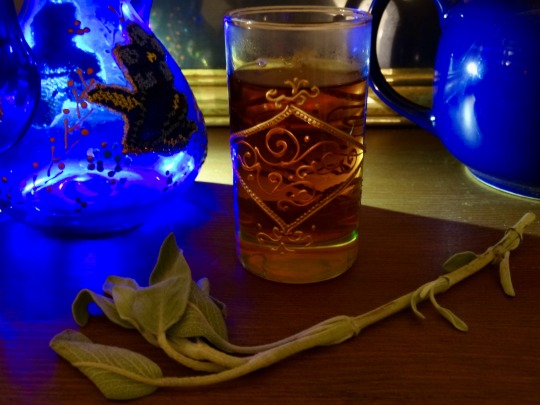
[ID: Light shone through a blue glass vase is cast over the bundle of sage and glass of tea. End ID]
"Preservation" and Green Colonialism
Of course, Palestinians and activists also suspect that the underlying purpose of the ban is to starve and intimidate Palestinians, rather than any real concern with nature. Israeli botanist Nativ Dudai points out that foraging causes much less harm to these plants than Israeli bulldozers do. Samir Naamneh, who sells foraged produce, also dismisses the environmentalist excuse for the ban on foraging:
We feel, and we know, and we’re sure, that the laws are made, on principle, against the Arab residents of the country, to hurt their livelihoods. It’s part of the pressure that Israel puts on us to starve us out.
The 1977 decision to add za'tar and maryamiyya to the protected plants list was ostensibly taken in accordance with a report submitted by a group of Israeli ecologists, which suggested that the species were in danger due to over-foraging. However, Israeli forager Yatir Sade (יתיר שדה) suggests that the converse may be true, and that the people who wrote the report might have taken their cues from the government.
On June 20, 1977, the inauguration of the Begin (בגין) Cabinet marked the first time that a right-wing party had held a majority in the Knesset; this dramatic change in Israeli politics would come to be called "המהפך" ("HaMahapakh"), "the revolution" or "the upheaval."
Sade's research reveals that, about a week later, on June 27, 1977, a team of ecologists at the NPA submitted a list of species to the Legal Bureau at the Ministry of Agriculture (משרד החקלאות), suggesting that they be declared protected. The list is accompanied by a letter of legal advice signed by a partner in the law firm Reva, Shein, Katz & Co. This initial suggested list did not include four species which would end up on the final 1977 list, all of them important culinary and medicinal herbs among Palestinians and Bedouin Arabs: babonj (בבונג / بابونج / golden chamomile), maryamiyya, za'tar, and ss'atr barriyy (صعتر بري / קורנית מקורקפת / Persian hyssop). [1]
But about four months later, on October 16, another letter was sent on behalf of the same law firm, requesting that these four species be added to the "protected" list, and that the standard procedure for adding them be expedited. Accordingly, on November 2, only a few days after receiving the letter, the Minister's office published the final declaration, with golden chamomile, maryamiyya, za'tar, and Persian hyssop newly added. The new Minister of Agriculture Ariel Sharon (אריאל שרון), part of the First Begin Cabinet and co-founder, with Menachem Begin, of the right-wing party HaLikud (הליכוד), signed the new declaration. It therefore seems likely that these plants were added to the list for political reasons and precisely because of their importance to Palestinian Arabs, rather than from any ecological concern.
It is also relevant that the 1963 and 1998 laws which criminalized foraging also laid out guidelines for the creation of national parks, nature reserves, and military and state memorial land. The text of the 1998 law, in particular, describes the goals behind creating these sites, and gives the council it establishes the authority to do anything necessary to promote those goals. These goals include to "protect natural and heritage sites" ("הגן על ערכי הטבע והמורשת"); to "maintain international scientific relations" in the field of nature conservation ("קיים קשרים מדעיים בין-לאומיים") ; to promote education about conservation among youth and students (7. (א)); and to promote travel and tourism (14. (א)).
Many discourses and strategies can here be seen operating together. The creation of nature reserves, state heritage sites, and military memorial land all within the text of the same law explicitly connects environmentalism to patriotism; creates special reasons for bringing land under state control, and imposing special codes of behavior on this land (i.e., natural and heritage sites); connects environmentalism to state ownership and control of land, and connects both to the education of youth and the creation of the ideal Israeli civic subject; uses environmentalism to promote Israel internationally as a scientific authority, a responsible steward of land (unlike the indigenous population), and thus a legitimate state; and sanitizes and 'advertizes' Israel internationally by associating sites of destruction, annexation, and ethnic cleansing with the concepts of environmental protection, natural beauty, preservation, and heritage.
Israel frequently declares land a "nature reserve" as a method of annexation, only to later build settlements on it (see Karimi-Schmidt p. 369 ff). Palestinians are forbidden from foraging certain plants within nature reserves (other plants are forbidden for foraging everywhere), and from constructing on them; they are thus alienated from this land, and dissociated from the ways in which they have long related to it. Yatir Sade points out that the four plants added to the original 1977 draft of the protected species list are typically harvested out in open areas, rather than within yards and villages; declaring these areas nature reserves, or arresting Arabs who enter them under suspicion of foraging, prevents Palestinians from moving freely, and from claiming any connection to the land. [3]
The "Green Patrol" (HaSayeret HaYeruka / הסיירת הירוקה), the enforcement unit for the NPA, was founded in 1976 by then-Minister of Agriculture Aharon Ozan and director of the Israel Land Administration Meir Zore, for the specific purpose of policing "open areas" (שטחים פתוחים) which had been declared state land, and preventing Palestinians from "tresspassing" ("הסגות גבול") or illegally building in these areas. [4] Through these strategies, land is appropriated for the state's and settlers' purposes under the guise of environmentalism.
In much the same way, the list of protected species is ultimately about using environmental science to cement state authority. Irus Braverman points out that endangered species lists function as a means of regulation, not least by being ostensibly objective: "their global power, mobility, and ubiquity derive from their configuration as scientific, technical, and quantitative, and therefore as neutral and apolitical." The protected species list thus joins other "environmental infrastructures," such as renewable energy and agricultural technologies, as a "mechanism[] for land appropriation and dispossession" of the indigenous population: together, these infrastructures make up a strategy that is alternately called greenwashing, green grabbing, and green colonialism.
[1] Letter regarding the declaration of national parks and nature reserves (protected natural values), 1977, from Ofir Katz to Tovi R. [מכתב בנושא אכרזת גנים לאומיים ושמורות טבע (ערכי טבע מוגנים) תשל"ז-1977, מאופיר כץ לטובי ר'], 6/27/1977. In: Proclamation of National Parks and Nature Reserves (Protected Natural Values), Ministry of Agriculture and Rural Development [אכרזת גנים לאומיים ושמורות טבע (ערכי טבע מוגנים), משרד החקלאות ופיתוח הכפר], January 1965–October 1982. State Archives, ISA-moag-moag-00119qy, pp. 164-175.
[2] Letter regarding a proposal to declare national parks and nature reserves (protected natural values), 1977, from Ofir Katz to Tovi R., [מכתב בנושא הצעה לאכרזת גנים לאומיים ושמורות טבע (ערכי טבע מוגנים) תשל"ז-1977] 10/24/1977. In: Proclamation of National Parks and Nature Reserves (Protected Natural Values), Ministry of Agriculture and Rural Development, January 1965–October 1982. State Archives, ISA-moag-moag-00119qy, p. 160.
[3] Yatir Sade, Master's thesis, pp. 68-9. Personal communication.
[4] Sade points out that Yehuda Reva (יהודה רווה), another partner of the law firm that provided legal advice on the matter of the 1977 protected species list, was also prominent in helping the Green Patrol expropriate Palestinian land and property within the bounds of Israeli law (Master's thesis, p. 44, FN 34).
Foraging and Food Sovereignty
The disastrous effect of these strategies and regulations should not be understated—but nor should their power to control Palestinians' behavior be overstated. Palestinians reference specific plants in writing and in art (including ceramics and tatreez), bring dried herbs to family members abroad, purchase or grow important culinary plants wherever they live in the diaspora, and continue to forage plants despite harassment and the risk of fines and arrest. Plants are an important way of symbolizing, and of practicing, resistance, resilience, and rootedness in history and in the land.
Foraging can be a strategy of reconnection in defiance of dispossession. Rochelle Davis notes that Palestinians often visit the villages from which they were displaced in order to gather grape leaves and herbs, “ingesting the place by consuming the land’s produce” (p. 172). Through this practice, as Anne Meneley puts it, "[e]ating becomes an act of momentary repossession."
The message boards on PalestineRemembered.com attest to this practice. When Mouttaz Ammoura returned to الطيرة (Al-Tira), the village from which his family was displaced, he noted maramiyya as the one plant he brought back with him:
Now I live in Canada, but far-away from AL-TIRA. When I came back, I brought with me some sand, maramieh, few stones, & water from Tirat Haifa. Yes, I brought all of that to remember al-Tira & to have it close to my hart back in Canada.
In an interview conducted in a Palestinian refugee camp in 1998, women demonstrate this same association of plant life with place:
They spoke of the names of land plots around ~ Tjzim (Wadi al-Nahel, Durat al-Qamar, Shana), and the act of naming evoked an aura of magic for those who remembered the places [...]. They also related to the wild plants. The women, who felt we had shifted to familiar ground, called out the names — khubeize (mallow), ‘aqub (tumble thistle), maramiyyeh (sage), za’atar (thyme).
Mirna Bamieh's Palestine Hosting Society put on an Edible Wild Plants Table, which registered the connection of foraging to place, local knowledge, and temporality. The project, which focused on "identifying the names, forms, locations and availability of wild plants in Palestine’s nature," involved a menu created from foraging in the mountainous regions of Palestine during the blooming season "from mid-January until the end of February."
Foraging is also one strategy among many that Palestinians use—alongside instituting agricultural innovations, creating native seed banks, educating about Palestinian cuisine, and seeking out contracts with foreign markets—to attain food self-sufficiency and sovereignty. It is therefore both a symbolically defiant strategy, and a practical one. Palestinians illustrate a belief in the illegitimacy of Israel's laws and claims, and insist on the primacy of their relationship to the land, when they forage for food.
When asked whether he believed that 2020 would bring the promised relaxation in criminalization of foragers, Samir Naamneh, who has been repeatedly fined, arrested, and tried over the past decades, told Dror Foyer (דרור פויר):
"We'll live and see, but it won't change anything for me: whether it's allowed or not, I'm going to forage. I do the work I love, and I'm at peace with myself. The fact that I'm making a statement to the State of Israel and their law—that's enough for me."
Donate to an evacuation fund
Donate eSims
Palestinian heirloom seeds
Ingredients:
250g filtered water
2.5g (1 1/2 tsp) high-quality loose leaf black tea
4g (1 1/2 Tbsp) dried three-lobed sage, or substitute another variety of sage
Sugar, to taste (optional)
Dried three-lobed sage can be purchased from a Palestinian brand such as Al-'Ard or Yaffa (not "Jaffa").
Instructions:
1. Combine tea with just-boiled water and steep for two minutes.
2. Add sage and steep for another minute.
3. Pour into tea glasses and serve hot.
Times and quantities are geared towards producing a tea that is mild enough to be enjoyed without sugar. Adjust as per preference.
366 notes
·
View notes
Text
you were not mine to save -> to be loved is to be changed
i keep thinking about how
if you boil down alhaitham & kaveh's akademiya-era fallout fight, it was that alhaitham wanted to change kaveh & kaveh could never agree with his proposed course of action
but now, as full grown adults, alhaitham isnt trying to change kaveh anymore

that core conflict does reoccur, as it did during Parade of Providence when alhaitham lectured kaveh after Act II & kaveh got annoyed
(even though Alhaitham was obviously just worried about kaveh's health/wellbeing...)
this is a common pattern of behavior for them: alhaitham is worried about kaveh & kaveh reacts defensively to it
which speaks to how stubborn & hyper-independent kaveh is
despite being someone who's dedicated to giving back to the community and contributing towards the larger social good, he's quite determined on his own path in life
he'll bear the consequences (ie bankruptcy) all by himself if necessary...! and he's much too stubborn to be talked out of his own decisions
i dont think there was any possible way kaveh could have walked away from the wrecks of the first build of alcazarzaray and still be at peace with himself
and kaveh even admits he was naive (in his teapot dialogue), but he doesnt regret it still even now
so i think its cool alhaitham realised that there's no point in trying to convince kaveh to change who he is
such is kaveh. kaveh will not be someone different, not even for alhaitham. his work & altruism are parts of his core identity
why fight a mountain who will not be moved?
instead, alhaitham goes for more "harm reduction" strategies:
help cover kaveh's bar tabs, which means he's also the one lambad calls to pick up kaveh & see kaveh home safely
snark at kaveh when he's ranting about clients to keep him in a righteous mood instead of getting depressed
there's a quote about how to be loved is to be changed....
and alhaitham certainly has changed so much from that smart-mouthed student who had pinpointed what he thought was the root of kaveh's overbearing altruism and figured he could fix kaveh's problems with that knowledge!
to now as an adult with a lot more life experience: alhaitham knows that kaveh isn't his to save
and the more he tries to force kaveh to changing, the more likely kaveh is to dig his heels in
alhaitham doesnt need to be kaveh's minder or overbearing best friend--
he wants to be kaveh's partner, his equal, which means respecting kaveh's choices for what they are
anyways kaveh's drowner analogy works rly nicely for this core conflict between them (changing people vs supporting them and protecting them from harm)
& i cant believe its canon




i really appreciate this aspect of their relationship too-- it feels very mature & realistic...
how easy it would be if you could just TELL someone how to fix their problems!
its very frustrating to see someone you care about run straight towards problems again & again...
but you can't change someone's mind bc you want it to be that way. they have to decide on their own, on their own volition, and to truly believe in their decision, for the changes to really stick
as much as it sucks that you can't just solve people's problems for them
the human experience is so much richer for all of our different perspectives and ideas and principles that will not be compromised bc someone else wanted it to be
you can't control people's thoughts & that's for the best (also alhaitham's SQ is literally about this lmao)
#genshin impact#kaveh#alhaitham#hkvh#dev thoughts#meta#twt crosspost#haikavetham#kavetham#haikaveh#obsessed with how their story ultimately boils down to#you can't force someone to change no matter how much you love them#you can only decide for yourself if you're willing to support them through life's struggles#they may change as we all do when growing older#but you can't expect that of them
188 notes
·
View notes
Text
What if instead of waking up in the mushroom body, sqq woke up in a doll.

Something something while lbh was away in the abyss, sqq without noticing offended a misterious (demonic-succubi-esque???) cultivator with a weird thing for making dolls. She had dolls all over her secret workshop that she very kindly let him into when she heard about the famous Xiu Ya sword being in the city.
What she wanted of him? Who knows, sqq couldn't bring himself to care. She probably wanted his money or try to steal his hair, the hair of those dolls seemed very much like real hair, although he had to admit the level of details on these dolls were amazing.
(she wanted to trick him into buying one of her cursed dolls and steal his life energy little by little, but got wifebeamed by widow sqq during their conversation about how talented she was to be able to make so many dolls, and without really understanding he rejected her with little to no emotion on his face)
So she cursed him, and since sqq didn't feel anything bad at the moment he thought it just didn't work and left, not sparing the curse a single thought after their encounter.
The rest of the story goes as usual, excep that after he self detonates his soul doesn't go into the mushroom body, instead it got directly into the shape of a doll in the workshop of this woman.
His first thought is thinking someone snitched the mushroom body bc wtf wasn't he supposed to wake up under the dirt??? Why this place smells slightly familiar? Like paint and humidity and floral perfumes?? and why everything looks fucking giganourmus?!?! A teapot should NOT look that big from his position....Oh no, did the mushroom body turned out as small as a squirrel? WhAT is happening?!
And then he looks at his arms and legs, and he has joints. White paper skin with joints in his wrists, elbows, torso, waist, knees, feet. And he panics, a lot.
The woman who cursed him starts monologuing about how she trapped him now, and you are mine, I made this doll specially for you master shen, this is my revenge for your insolence to leave me yada yada- Sqq stoped listening a while ago.
Somehow he manages to escape from this woman and now he is roaming around as the size of some apples. Everything is huge. Everything is dangerous, even the grasshopers! And this body is fragile! He can't feel heat nor cold, neither hunger or other things, but he is useless with no spiritual veins inside, and if someone is not looking carefully, they might crush him. And the way back to cq is gonna be a hell of a trip! But he needs airplane to fix this. He can't stay as a doll forever! He needs a mushroom body and then fly into the sunset far from this mess! Adiós! Goodbye! So his new plan is to infiltrate into cang qiong, look for that rat and disappear. Sneaking into some disciple's pouch must be enough to break in.
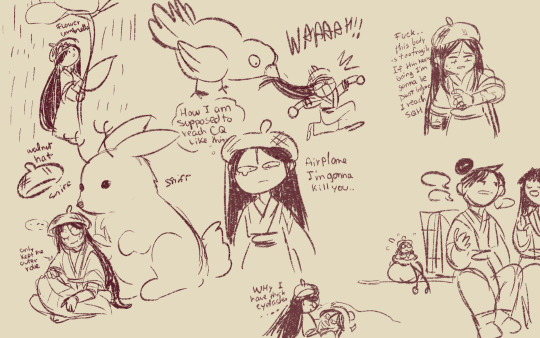
Something something it only had passed a few months since lbh stole sqq's body and everything is still very fresh. CQ mountain is a hot mess. Sqh frankly needs to lay down and take a nap. Lqg keeps figthing with Lbh practially every day and coming back beaten bloody, he has his king pestering him and a lot of paperwork to do, Lbh is a pain in the ass, Yqy is really close to snap and start a war with HHP, and he knows nothing about his bro. So yeah. Such a great time to be alive.
The mushroom bodies should had been ready, right? He must be alright...Yeah. He has enough already to keep him busy. Cucumber bro is gonna come out and stumble across at any moment. No one would bat an eye if he takes a nap, right? He deserves it. He is overworked enough for another lifetime, his head hurts, his bones hurt everywhere, a short nap should be fine...
Until he feels something small tugging his robes and a cold tiny finger poking his eyelids. But he doesn't want to. He is very comfortable on the floor of his office. Whatever bird decided to pick a fight with his face can keep trying.
"AIRPLANE, WAKE UP, YOU HACK! I NEED YOU TO FIX THIS! WHY IS A WITCH WITH ANACHRONISTIC HAUNTED DOLLS IN THIS NOVEL? THIS IS ALL YOUR FAULT!"
That voice. That fucking annoying voice was of just one person and one person only. He opened his eyes, looking for the source of the unmistakable voice of his No1 hater, but he came across with a pretty porcelain doll. With a very ugly sneer in it's face.
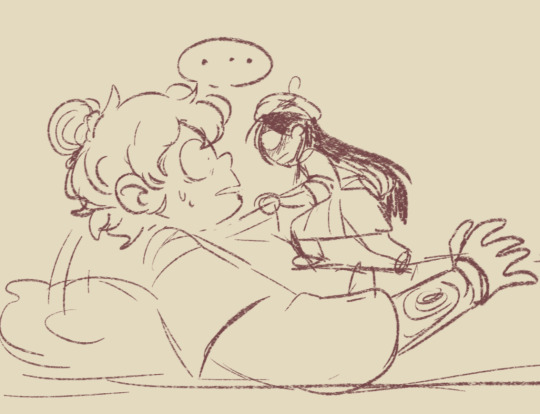
"W-Wha-?...Bro-?!"
"Fucking finally! Why are you sleeping on the floor in your ofice?! I was looking around your bedroom like an idiot! Do you know how close I was to falling from your window?!"
-TBC-
#svsss#shen qingqiu#人渣反派自救系统#I don't have a lot about this au bc I just imagined it today#shen yuan in a doll body au#I still need to reach lbh#oh boy that is a can of worms idk if im prepared to open#so any idea of how to progress the story is welcome#since he would be still in his strongest shock and denial#what if sqh has to bring sqq along w him to hhp bc he has there all his plans and secret stuff idk#or to use any hhp treasure or smt#too many posibilites and imma sleep#wip#shang qinghua#I got this idea while watching Barbie
904 notes
·
View notes
Text
I like Beauty and the Beast cartoon. And I adore Bagginshield. These two universes were made for each other…
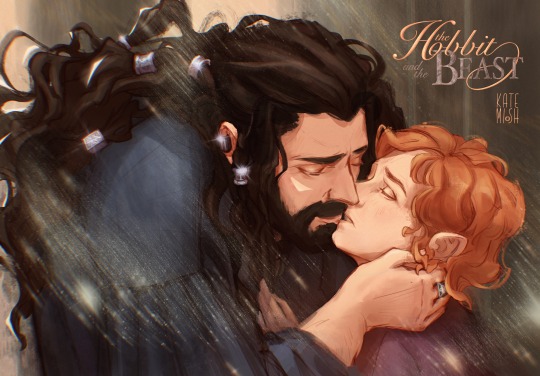
Okay, this must have already been thought up, drawn or written by someone before me because it's so perfect and obvious.


In the kingdom of Erebor lives the greedy and rude King Thorin. One day he refuses to shelter an old man in his beautiful castle under the mountain. The old man turns out to be the ancient dragon Smaug. He is enraged. He sends a curse on the King and his entire kingdom. Smaug turns the King into a monster and his inhabitants into utensils of gold.
And so Balin becomes a clock (Cogsworth). Instead of one candelabra (Lumiere), there are two bigger and smaller ones, Fili and Kili. Ori becomes a cup (Chip). And Dori into a teapot (Mrs. Potts).
Not far from the castle is the small town of Shire. Here lives a strange family of Beggins: Bilbo and his nephew Frodo. They are unsociable, a little strange, in no hurry to start a family.
Bilbo loves stories, books, maps and dreams of long journeys and adventures. But the most popular and rude hobbit in the Shire, Azog (Gaston), wants to take Bilbo in marriage.
One day Frodo leaves town and ends up in the castle of a monster. But Bilbo finds him and offers to stay in return. And that's where the story really begins.


And just Bilbo's vest of perfect yellow color from the first part of The Hobbit (the first meeting with Gandalf), in which he dances with the Beast-Thorin to the song Beauty And The Beast…
Sorry if there's a bunch of dumb mistakes in the text, I'm terrible at English ._.
#bagginshield#thilbo#bilbo baggins#thorin x bilbo#thorin oakenshield#fan art#art#illustration#procreate#digital art#the hobbit#TheHobbitAndTheBeastAU
995 notes
·
View notes
Text

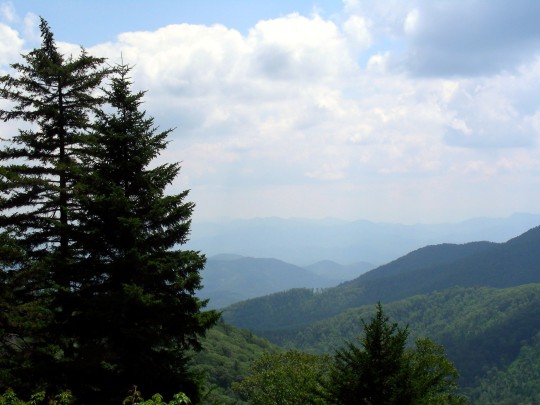

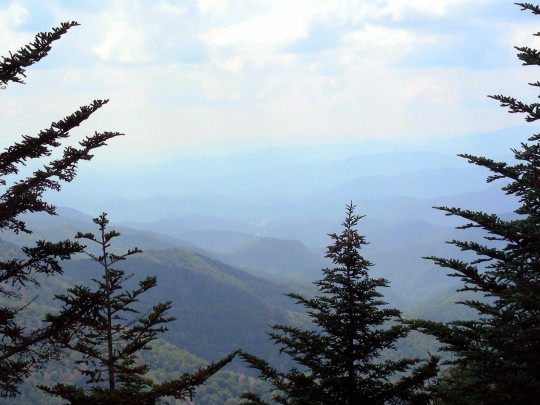

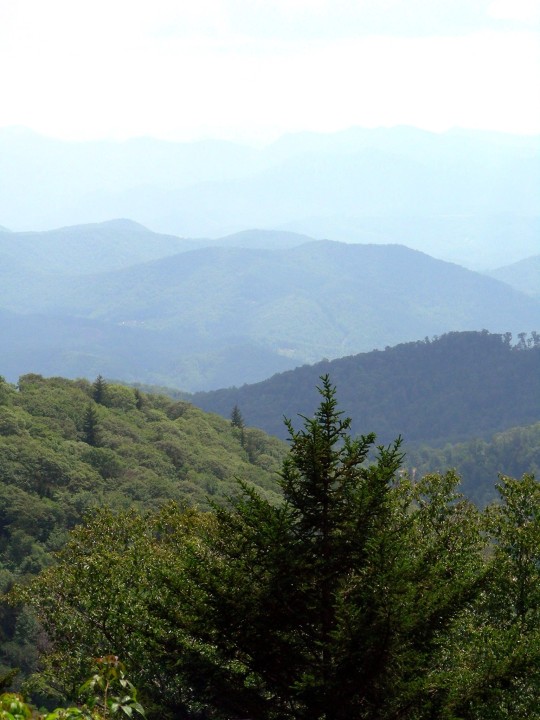

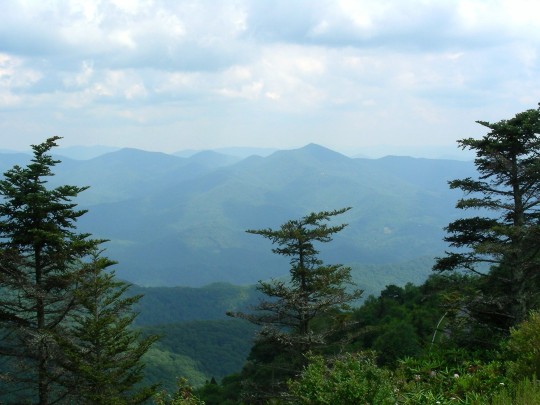

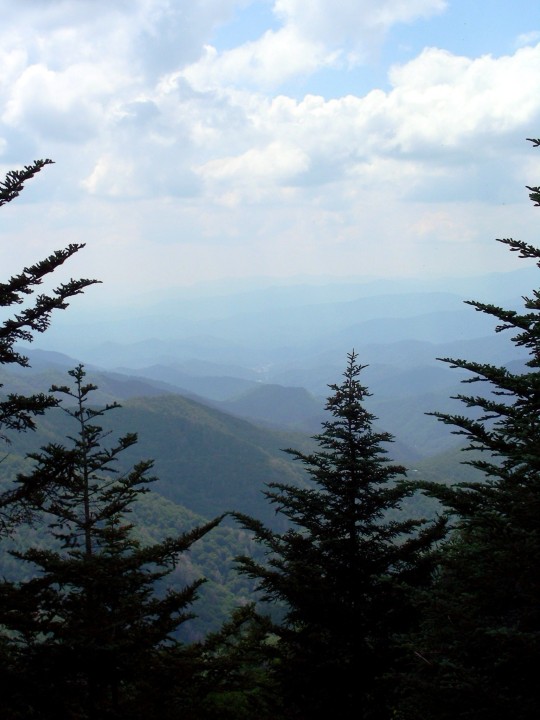

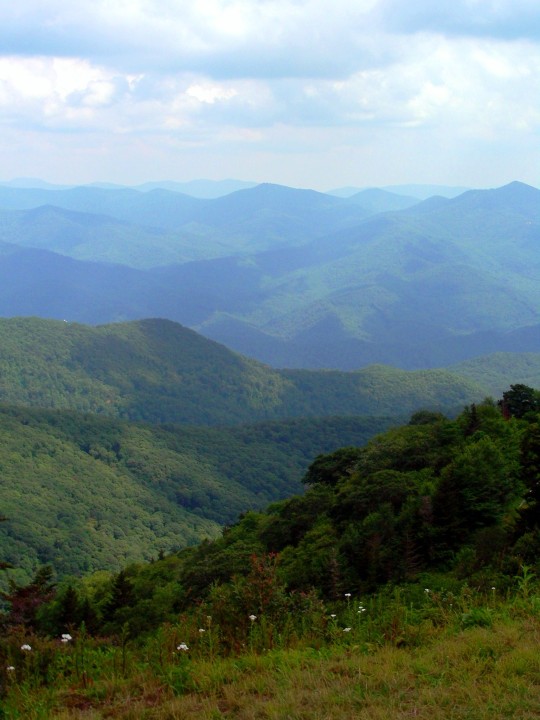

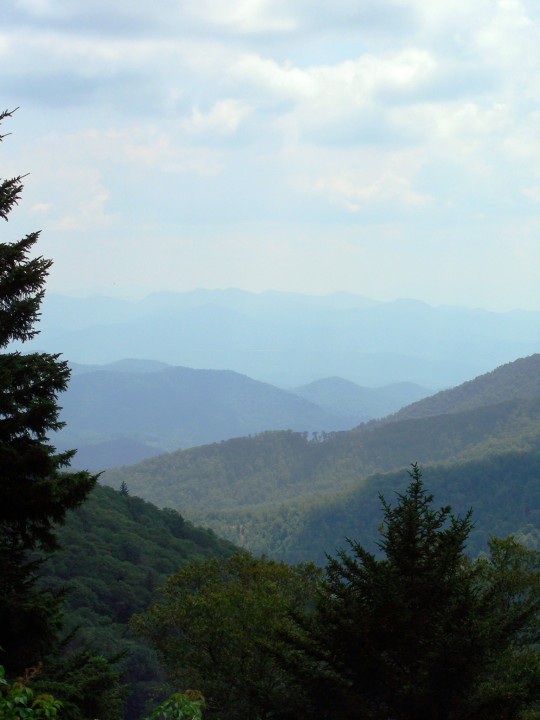

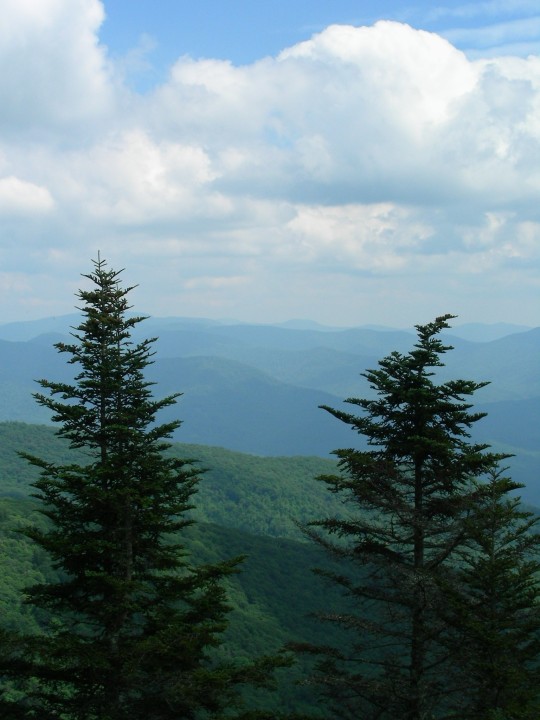
West Virginia was admitted as the 35th U.S. state on June 20, 1863.
National West Virginia Day
National West Virginia Day is on June 20 every year. This day celebrates West Virginia as the last state created from one of the thirteen original colonies under the British Empire. The day marks the birth of a region that is home to some of the largest forests in the country, an industry of coal mining, and a rich cultural history. Yes, there is so much that West Virginia has that its residents can be proud of. This West Virginia Day, step out and explore the beauty and history of the state. Most importantly, let your infectious energy inspire others to celebrate, too! West Virginia has vast beautiful landscapes with three popular mountain ridges namely, Allegheny, Appalachian, and the Blue Ridge Mountains. West Virginia is the largest producer of coal east of the Mississippi River. The state has deep cultural roots and heritage from its native ancestors.
History of National West Virginia Day
Before the arrival of European settlers, West Virginia used to be a favorite hunting ground for numerous Native Americans. It has old earthen mounds constructed by different mound builder cultures. Once the Europeans arrived and settled here, the locals were pushed to the outskirts.
The earliest civilization in the region was in 10,500 B.C. when the Paleo-Indian culture appeared along the major river valleys and water sources. Subsequently, the Adena culture was the dominant influence in West Virginia in the year 500 B.C. The Adena Indians would use ceremonial pipes almost like works of art. They were also called the Woodland Indians. They lived in round wicker-sided and bark sheet roofed houses — wigwams and grew sunflowers, gourds, and squash. Their community had farmers and cultivators. They also reared dogs as pets.
The formation of West Virginia as a state in the U.S. was a tumultuous one due to the sectional differences that existed within it. In fact, around 2,000 residents had even petitioned for the creation of a 14th colony that would be named ‘Westsylvania.’ This colony would have included Maryland, Virginia, Kentucky, and Pennsylvania if the petition had been approved by the Continental Congress.
In 1829, the Virginia Constitutional Convention met in Richmond to discuss reforms to Virginia’s outdated constitution. Philip Doddridge wanted western Virginians to get a more democratic system of government but these desires were rejected by leaders from east of the Alleghenies.
The state of Virginia voted to break away from the United States during the time of the Civil War in 1861. This was unsuccessful, leading to the formation of the state called West Virginia which would be in support of the Union. When the American Civil War occurred, Virginia almost left the United States and was all set to join the Confederate States. However, on April 20, 1863, President Abraham Lincoln made a decision that changed history as we know it — he declared that West Virginia would be a part of the U.S. as a separate state. Virginia became a member of the Union in 1863. By 1864, the informal celebration of West Virginia Day was common and it formally became a state holiday in 1927.
After the formation of the state, there was also some discourse regarding making the city of Wheeling the capital. In 1870, Charleston became the capital instead, but the decision was again reversed to make Wheeling the capital in 1875. To solve the matter once and for all, a statewide vote took place in 1877, and Charleston was finally elected as the capital. Every year on West Virginia Day, ample festivities take place across the state, as well as in the Charleston capitol complex. Seeing the complicated history of West Virginia, it is not a surprise that people go all out in celebrating its creation.
National West Virginia Day timeline
10,500 B.C.
The Earliest Civilization in West Virginia
The Paleo-Indian tribe appears along the major river valleys and water sources in the region.
9000 B.C.
The Early Settlers
West Virginia is populated by the first settlers.
500 B.C.
Influence of the Adena Indians
Also called the Woodland Indians, they make contributions to arts and culture in West Virginia.
1700s
The Change
The Europeans begin colonizing the land.
1829
The First Constitutional Convention is Organized
The Virginia Constitutional Convention meets in Richmond to discuss its outdated constitution.
1863
West Virginia is Granted Statehood
Congress grants statehood to West Virginia on June 20, 1863.
1942
Paying Homage
A law requires students and teachers to salute the American flag.
National West Virginia Day FAQs
What is closed on National West Virginia Day?
It’s a state holiday in West Virginia. For this reason, many government offices, libraries, and schools remain closed on this day.
Is West Virginia a Red State?
West Virginia is a Republican state currently. Republicans John McCain won the state in 2008, followed by Mitt Romney in 2012, and Donald Trump in 2016 and 2020.
What is the most common job in West Virginia?
The most common jobs held by residents of West Virginia are cashiers and sales workers. Truck drivers and registered nurses are also some of the common professions.
What is the safest city in West Virginia?
Currently, New Martinsville has been declared the safest city in the state.
How To Celebrate National West Virginia Day
Plan a trip: What’s a better way to celebrate this day than to plan a vacay to West Virginia! It’s a gorgeous state with lots to see and do.
Research the history of the state: The best way to celebrate the day is to research the heritage of West Virginia, its history, why it was formed, and how it has progressed over time. Reading up on the culture of any country, city, town, or state can truly be inspiring.
Visit their local museums: If you are visiting the state, make sure to drop by the local museums there. It will give you a lot of insight into the state’s history and culture.
5 Interesting Facts About West Virginia
It was supposed to be named ‘Kanawha’: The state was to be named after a Native American tribe, but officials went with West Virginia.
A Native American burial ground: The oldest and largest Native American burial ground in the nation is located in West Virginia.
A large discovery: North America’s largest alluvial diamond, the Punch Jones Diamond, was discovered in Peterstown.
The first rural free delivery mail service: In 1896 in Charles Town, the Post Office Department’s pilot program launched this mail service to try out the practicality for a country-wide rural delivery system.
The oldest dime store is found here: America’s oldest dime store, Berdine’s Five and Dime, is in Harrisville in West Virginia.
Why We Love National West Virginia Day
It is a beautiful state: This day makes us look closely at the many natural landscapes that this state has to offer. There are so many things to see and appreciate here. West Virginia Day brings to light the past of the state and the hurdles it had to overcome to earn the status it has today. It’s achievements like this that fuel the fire of patriotism.
To remember the history: Days such as these play a great role in highlighting the history of a country. This reminder is important so people never forget the sacrifices that were made in the past. National West Virginia Day also tells us about how West Virginia achieved statehood and the many political discussions and debates that preceded that. We must always remember the contributions of everyone who made this a reality.
To boost tourism: The increase in tourism can always help local communities in the state. It will also boost the overall economy of West Virginia if more tourists come to visit. West Virginia day excites the residents and motivates them to acknowledge the long journey the state embarked on to make a difference.
Source
#World's Largest Teapot#Chester#Appalachian Mountains#C.A. Smith Mansion#architecture#original photography#vacation#tourist attraction#landmark#travel#cityscape#landscape#roadside attraction#Blue Ridge Mountains#2009#forest#woods#countryside#anniversary#US history#US Civil War#35th US State#20 June 1863#American Civil War#USA#National West Virginia Day
2 notes
·
View notes
Text

pitch in a teapot
sanemi x inn keeper
reader has a business to run and sanemi can't help but watch you do it well, barking orders, teaching firmly, smiling and scurrying around like a fancy little bell. There's something he's been trying to get out of you all afternoon but chores keep stealing you away. cw MDNI, frustrated thunderstorm quickie, reader w vagina + penetration, slight manhandling, desperation and a little bit of sass. 4.1k
thank you so much my darling @neiptune for requesting a little sanemi this @ficsforgaza season! you were so generous and patient waiting for this to come out, I hope you enjoy angel

Six bowls of soup upstairs and an old man somewhere in the bowels of the inn with a limp and half a shoe. Right, okay, send two girls to the garden– no. One to the garden and one to the kitchen. That’s dinner taken care of as long as the scholar with the fat pony– donkey, maybe– doesn’t regurgitate an encore of the rakugo performance that couldn’t have been funny in the first place.
You roll the sleeves of your apron slightly tighter in their tasuki. The cyprus walls of your inn bleed fragrance before summer thunderstorms so you make a mental note too, to order storm doors for the second floor before the clouds go black and blue. Incensed breeze, juniper, wisteria, paper windows, one foot, the next, again, each step down the wooden hallway is a quiet knock. Each summer at home is heavier, heavier, and this year is the flood.
“Oi.”
“Not my name,” you blow from the corner of your mouth without changing pace. That breath was ready to jump off your lip before the demon slayer even called out to you; he hates doing nothing and hates even more what great pains your staff take to avoid his room.
“It reeks.”
“Excuse me?” You huff and this time do turn enough to interrogate him via glare. Sanemi, ridiculous, folds his arms in the doorway of a very nice room, a too nice room, without any of the appropriate embarrassment of someone who has been lying in wait. The stippled blue pattern of his robes doesn’t suit him. They clash with his ugly scars and uglier attitude but don't keep him from wearing the chest wide open like a well paid rent boy.
“Stinks.”
“Whatever of, princess?”
He growls and drops his arms as you brace for the lecture, “Demons.”
His heart is incapable of peace and yours with it, and every summer he’s assigned a post in your mountains by a master you’ve never met and who couldn’t possibly be sane themself. Four years of this. Four years of twelve weeks of sixteen-hour-days of the world’s most neurotic demon slayer.
“The whole property is wide open for any fuck to attack.”
You adjust your grip on a slender bucket handle and the cloth in your other arm and continue back downhall, “You always say that.”
“I’m always right,” he nags and pushes free of his bedroom.
You met Sanemi when you were sixteen and still working under your parents. He was a brand new hashira then and prone to fist fights, spitfire, bloodshed. Nothing special. Nothing new. Hashira come and die and new hashira come again. They arrive in flashbangs and ego and leave like everyone else, in pieces.
Your parents were calm, they had peace and practice, they ran this inn, they welcomed Sanemi with his summer floods. They loved him, took his counsel and died by it, and they probably wouldn’t have lost an old man inside the house. But this is your inn now. They aren’t here anymore and at your inn sometimes old men get misplaced.
“And what would you like me to do about all that, sir?”
The hashira keeps an easy military pace behind you, “The gardens need to be reinforced and–”
“Nine acres of wisteria arbor need reinforcement? Yeah I’ll get right on that.”
“The storm will take out ha–!”
“And the other half will hold until autumn. Go berate the kitchen staff for their unpreparedness– they’re all unarmed you know? Totally unprofessional.”
“Y/n–”
“Shinazugawa,” you spin and it all comes out as a threat, a hiss, instead of just a whisper so much so that the water in your bucket nips up your sleeve. “I am the lady of this establishment and you will not address me so familiarly.”
Dark cyprus, cool hallways, the undeniable scent of thunder. Sanemi rests his hand on his sword to glare like he does when his hands don’t quite know what to do with themselves. His eyes roam, quiet under long lilly lashes until they have traced the shapes your tasuki makes with your waist and rise again to your gaze. “We’re not fucking finished.”
“Go eat,” you snap and turn back down the hallway, red at the ears. Lady of the establishment, great job.

Feet aren’t complicated, bone to tendon, tendon to muscle, muscle to skin, one step and another. You tilt your head back and an eager girl rises to wipe sweat from your temple.
“Like this,” you hum and tilt the old man’s heel in your palm. He winces but lets you continue while the girl stares on. “When the skin is split like this it can’t receive moisture– sorry sir, better?” You set his foot on the hammock of cloth between your thighs, “So you need to soak it first before applying salve. Yeah?”
“Yeah,” the girl parrots, still unable to look away.
“Yes.”
“Yes, ma’am.”
You smile through an eye roll but gesture for her to come sit beside you. You’ve been like this since he’s met you, too old for your body.
You’ll train anyone who asks, hire any runaway girl, absorb the cost of thieves when runaways are exactly that, and you will wash old men’s feet before eating dinner with the self preservation of a samurai. Famously long-lived, those. Sanemi has to look away when you take scissors to the gnarled yellow nails and almost covers his ears when your pupil starts asking you questions about it.
“Feels good right?” You chuckle at the man’s response to your ministrations, and then a little louder, when you realize just how seriously the girl beside you is trying to focus. Birdsong. “Do you have companions on your pilgrimage, sir?” He shakes his head.
You lean away again so the girl can dab your brow and push back stray hairs and turn back to explain overdetailed care instructions to this man who is obviously so embarrassed he can’t hear a word you’re saying. Something about tallow and socks, Sanemi tries to read the syllables off your lips and loses focus the second time your teeth catch damp and pillowed pink.
The man seated in front of you grumbles some and flexes a few fingers around his cane like old men do, but doesn’t protest your instructions. He nods instead of thanking you like a real tough guy.
“Fetch a new pair of sandals from the garden shed,” you instruct your girl who bolts up and out the door past Sanemi without so much as a breath. “And you,” you turn back to your patient, “keep the nails short, you hear?”
He nods again, increasingly avoidant of eye contact. Sanemi tenses in the dark outside the guest’s complimentary room and hates ungrateful fucks enough for both of you.
“And don’t skip any more meals.”
The man’s wrinkled skin unfolds at his eyes and he pulls his legs back underneath him. You dry your hands after scrubbing clean in a soapy pot and stand to collect your tools. “I couldn’t find you this evening and I hate to lose track of my guests at mealtime.”
You are going to feed every stray you find until the economy collapses. Peasant monks, pickpockets– you’d put up a demon if its stomach growled. After too many unnoticed minutes watching you, following the white x between your patterned shoulders, eating your voice, warming the hallway, you finally pick out Sanemi’s eyes in the dark behind the sliding door. He’s waiting for you. You clear your throat for the broke old pilgrim one last time, “You don’t owe any money. Do not skip meals.” And bid him a wordless good night. The door cracks shut behind you. It isn’t late enough for sunset. Thunderstorms make it so dark so quickly and they mask the scent of blood with all their rain and iron. “What is it?” You deadpan and shuffle towards the stairs with all the confidence in the world a tenured hashira will work to keep up with you.
“Not fucking finishied with you,” Sanemi grunts, working to keep up with you. The apron over your service kimono forces your hips to sway in tight little circles and Sanemi sucks his teeth. He doesn’t look away.
Through the hallway and down the servant stairs, socks on polished wood, you tap, tap, tap nimbly to your next assignment. The room below radiates heat and life. “What do you want?” you whisper.
“I–” he slips barefoot on the slick last step into the kitchen and you stumble in your newly damp right sock. “Euh, I–”
“Mimiko!”
“Lady?”
“Wet.” You point behind you, palming Sanemi out of the way, and a free washerwoman dives for the spot with the rag tucked into her belt. The kitchen rages silently in the easternmost corner of the mansion; men and women sweat over donabe, rinse their body weights in rice, and beat little fires with littler fans. Two women and a boy linger just outside the paper door in clothes that match yours for formality and Sanemi assumes as he weaves through the bustle, that they are responsible for bringing food to customers and for doing everything they can not to sweat through their pretty borrowed uniforms. Your own kimono is purple tonight, a cool little shape bobbing nimbly between flames.
Sanemi opens his mouth to shout after you and shuts it again just as quickly to grind his teeth instead as you lift your apron over your head. You let a girl feed you a spoonful of something on your way out of the room and she wiggles when you nod several times before ducking through the door.
Laundry next, then a double check of the firewood cache and the whole while Sanemi occupies your shadow. A few times you hiss over your shoulder at him for looking so gruff, for looking like a bodyguard, for making your customers imagine your distrust of them, always you bite back before he can get more than a few words out but mostly you just scurry in preparation for the storm picking up warm wind outside.
You avoid the entrance with him so close in tow, armed and obstinate, but make a show of circling both tatami halls where guests come after dinner on rainy nights to stretch and smoke by the brazier with strangers. A female musician trills her koto. The sky hasn’t let loose a single drop of rain yet but wet hangs like a fog and thunder scents the air ahead of its arrival. As Sanemi trails the outer walkway of the mansion behind you, the sky bleeds with the last of day’s light in the cracks between bruised and racing storm clouds.
“Second floor secure?” You confirm with the men slotting thick panels into grooves where paper doors usually go. They nod in their white uniforms. Beyond the porches, beyond the east garden and its fat green vegetables, beyond dogwood trees and sarusuberi and maples that have begun to tremble violently in winds buffeted by humidity and nightfall, the wisteria arbor glows. You radiate a cool purple pull beside him just like your flowers.
The arbor surrounds the property on all sides for half a mile and all three paths away from the house are barred by gates of twisting wisteria vine. The inn belongs to your family, but does not serve Ubuyashiki. Theirs is not the only house that discovered a use for these flowers. Yours is not the only wisteria business in the country.
“Do you see that?” You murmur at so much the same tone as the wind that Sanemi almost cannot hear you.
Three years ago he left before the end of summer, called away to investigate a massacre nearby. A tree fell that season. It crushed a straight path through the edge of the mountain forest and onto your property where, lured by so much blood and wine, a pair of sister demons descended through the broken orchard and devoured everyone who wasn’t fast enough to hide in the flowers like the slayer suggested they should in an emergency. Your parents evacuated the house and died in it with the guests who couldn’t walk on their own. Nestled under three braided vines at the far edge of the property, you listened to them die.
The winds kick up sand from your vegetable garden and you step off the porch into the start of the storm. Tiny and purple. “Y/n!” Sanemi lunges for you. His sword whips the meat of his thigh and you step out of his way before he can grab any part he intended to. The men on the porch watch you both scramble through the backyard. You snap at the strange guest and duck when he swings a hand towards you, hop in your sandals when he tries to trip you into his arms and dart away like a dragonfly.
“Get back here!”
“Go inside!”
“Y/n!”
“How dare you!”
“Motherfucking, Y/n!”
“That’s enough!” You bark and twist back towards the garden shed. Your pupil left the door wide open and all its shining tools caught your eye across the yard. Sanemi was staring when you stepped outside. His eyes feel like beads of sweat on the few bare parts of you. His gaze is all teeth on the back of your neck.
With all but one storm door up, not a single guest can hear the ruckus you two kick up outside in the prologue of the storm. “It’s about to pour!”
“Then go join the other guests!” You shout through a particularly violent breeze and you have to grip to the break in your kimono closed. He does not. By the time you lay a winded hand on the wall of the shed, it has started to rain.
A silencing wall of water falls from the back of the property straight towards you. It kills dust clouds in its path and paints every surface soaked in a perfectly straight line. Sanemi rushes from behind and nearly lifts you off your feet to get inside the shed as you watch the supernatural army advance on your home.
“Shit,” he grumbles and winces when the rain overcomes the little shed and splashes off the pavement into his face. He pulls you deeper inside and you jolt. The first crack of thunder is a scream that shakes the ground, “Scared of thunder now?”
“Scared of my profit margins, you oaf.”
Under his shoulder you are glaring at the storm between this shitty stuffy shed and your business. You are so small and wrapped so tightly in layer after layer of fabric. It must be hot. The damp drips down his open chest and thighs, it frizzes his hair at his ears. You must be sweating somewhere in that formal getup. Wet glistens at the curled little hairs on the back of your neck where the skin is just barely visible and it sparkles under your high collar.
“I can’t walk back inside soaked,” you groan, “there’s not enough time to change before final rounds.”
Sanemi takes his hand off his sword. There must be damp parts of you hiding from him. He brushes his knuckle up the bare skin of your neck, across your throat, and you falter slightly.
“Sanemi–”
“Nuh uh, don’t address me so familiarly,” he smirks and cups your cheek in his big hand when you jerk around.
“That’s not–!”
“Not what?” He smiles now, and drops his hand back to his sword so that you might find your own weapon and finish the fight. Four years of this.
You shove a finger into his chest, “You’re such a clingy fuck Shinazugawa,” and shout a little because you know the thunder will hide it. A sudden gust blows the sheet of rain sideways and straight inside the open door of the garden shed, up your dress and down his robes and through your prettily pinned hair. “Y/n this, y/n that, I’m busy Sanemi, I’m stuck in a shed! You’re the only one who calls me and people think we’re fucking! You want my attention you have it so please tell me all about the demons that’re gonna slurp up my customers and fuck my taxes to shit and–”
The door creaks in Sanemi’s hands even through the oceanic sounds of storm when he begins to close it. He nods as you get louder, nods as he slides the door closed and flicks the latch.
“Do not,” you growl, “there’s five thousand–”
“Five thousand little bitches in there lost without direction? They’re fine, Y/n.”
“Don’t call me that here.”
“They’ll survive, little lady.”
You spit, “not better.” And the new humidity of the closed shed begins to swallow you whole. It fills your throat. “What about all the demons you’ve been crying about?”
“You’re such a cocky cuss.”
“And you’re needy,” you taunt. It’s Sanemi’s turn to wince and his frustration starts to drip from all those places he shoves it away from you. He's been gentle with you since that summer. He lets you interrupt him, he follows where you go. “I watched you check perimeters this morning, you don’t need to talk to me about demons.”
“Eyes everywhere huh?” His throat is pink, “Lady of the house.”
You grin and pull him by the loops of his robe into your tiny purple kiss, “Shut up.”
“M’lady,” he growls against your lips and succumbs.
Four years of stolen touches, lips on damp summer skin, coming out of empty rooms too ruffled and pulling the hashira between your legs without disturbing the folds of your work kimono. “Don’t call me that either,” your breath hisses against his throat like an iron and he drops his sword quickly to gather you in his arms.
Too much fabric. Shovels and shears clatter against the floor and one another when the thunder shakes their little house again, and they tremble at every thump and roll of your body against Sanemi’s. He pulls your hips against his and guides your legs around his waist so he can sink into those soft parts of you. So he can tilt his head back to look up at you, so you can pour your kisses down his throat like wine.
You drag your nails up the back of his head when he offers his tongue to your lips, biting, suckling, drawing out gentle sounds and eating them before they compete with the rain outside. Where his hips dig into your own the folds of your skirt fall apart. Legs that glisten with sweat and rain part nicely for him and his own robes grow clingy with exertion where he grinds hard against you. Every subtle roll breaks your concentration in kisses, in lips sliding, begging with salvia and rainwater. His hands cup your cheeks, thighs, the collar of your kimono shudders open for him when he dips to suck bruises under your jaw and the swordsman’s hand loses control as he grips your belt to free you from all this formality. He’ll press crescents into your breasts, he’ll lower his tongue through your peach sweet folds and drink until you cry– but you pull his head back with a sharp yank of your wrist.
Your breath comes in clouds. The inn glows with candlelight across the yard but the light through the shed’s window is too weak. Welts of lighting illuminate the flush of your chest and cheeks. Two seconds of bright and twelve of dark warmth, shaking swirling thunder and then only rain. Sweat rolls from your temples and into the depths of your kimono. It’s been days since he’s had you like this and longer since you’ve had true privacy, others a whole yard away.
You can’t be gone long, he knows. Staff watched you race in here together, watched him shut the door, he knows he knows, he just can’t put you down yet. He leans in for another kiss and you let him fall close enough for his chest to crush yours before pulling back on his hair again.
“Y/n,” he’s suddenly not above begging but you hold his gaze tight. You watch him as your hand slips between the place your bodies meet. Pretty fingers reach for the heat between his legs. Pretty knuckles ghost over the swell of his robes and draw the fabric aside instead of ordering he bring you back inside. Sanemi’s cock perks up in free air as high as this position will let it and rests heavy under the swell of your ass.
He kisses you again, toothy and smiling and when you kiss him back your sharpest teeth clink together. He ruts into your desperation against the wall, harder than the rain, harder than the wind that threatens to blow your shed away and you with it. Obviously he wouldn’t let it but the thought that nature might be jealous of the rumple you made of each other drives him harder against you. Slipping, cock hard and suddenly shifted up against the hair under your belly. Peach fuzz yields to warm slick and Sanemi drops his head to your chest when he shudders to avoid whimpering into your mouth. He slips through your folds with a tight hold still under your thighs and drags himself up, down, up, hypnotized always by the faces you make when you’re trying to keep quiet.
The scars across his body are forever numb, but when your clammy hands paw is his chest he swears he can smell color. He can touch light when you pull his face back to yours frantically, when your hips with all their fabric flowing off of them buck sloppily against his, when he thrusts once deeply inside of you and forces a broken gasp from the back of your throat.
Before you can catch your breath your lips have crashed against his and his hips against yours. Sanemi keeps the relentless, restless, starving pace you like and knows he’ll last only the next few minutes before the worst of the storm blows over. Again and again he carves a palace for himself inside of you. You guide him with the falter of your kisses when he finds that perfect spot and with the slick that coats both of your thighs. Your voice escapes you in choked whimpers, his name comes out in hiccups. You’re a little bell in his arms folded in half and singing for him.
Again and again, out and so deep back inside, Sanemi’s feet grip the floor as he plunges his hips into yours and both of your bodies into the swelling wood walls. His rhythm staggers as you flutter around him and with his head against your shoulder he watches the circles you draw on your clit with the tips of four clumsy fingers as your other hand muffles your voice. He grabs that quieting wrist without thinking and without taking his eyes off the place your bodies connect with lewd squelches and sticky white threads. His threatening grip, his thick cock and your fingers push you right over the lip of your pleasure and fluttering becomes milking spasms quicker than Sanemi can think to treat you gently. That half-sobbing voice he loves so much cheers him towards his own climax and the more sensitive you grow the easier it is to coax those sounds out of you that you try to keep hidden, “Don’t– don’t be so quiet.”
“Inside,” you whisper in reply and draw his face into your hands as his pounding stutters in pace and loses all flow completely under your dreamy gazes. Sanemi can’t keep his eyes open when he cums. His pretty lilly lashes flutter with lost concentration. He shudders, ruts you deeper into the wall and groans with release as he fills those swollen wet parts of you. Warmth pools in your belly and trickles off his cock still buried. Sweat falls like the rain outside.
“Wanna taste,” Sanemi rumbles without setting you down or stilling his thrusts fully. He nuzzles somehow farther into the dip of your collarbones. Soft snow white hair, a heartbeat in the fingers that grip you. Every twitch of his hips is a starving ache.
“C'mon,” you grin, “dinner’ll get cold.”
“Let me taste you.”
“Sanemi, what will I eat if you eat me?”
“Have a few ideas,” he smiles back through the trembling of the shed in encores of thunder and gale. A leak tip tap tip taps nearby. Four years of this, maybe more.
#love this guy#think he gets whipped easily#ego free whipping he doesnt even struggle with it#total tunnel vision#sanemi x reader#ficsforgaza#kny x reader#demon slayer x reader
371 notes
·
View notes